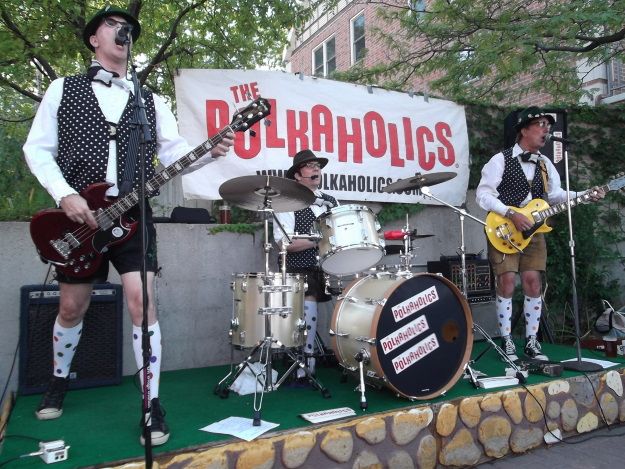Many years ago I took a journey to Iowa to bring my father's ashes home. There are several family burial plots at a cemetery down there and some kin ran a headstone business in the town. For the first time I met a cousin of my dad's and he told me a funny story about my parents' wedding. He recalled a brief chat he had with my maternal grandmother at the reception as the band was playing a polka. Approaching her, he asked if she danced the polka and she replied that she did when she was younger but, since her knees had started giving her trouble, she'd stopped. Then someone came up to her and extended the invitation, "Let's dance!" She put up no resistance whatsoever as she was led away to shake her booty, knees be damned!
I'd always known that I have relatives down there in that part of Iowa but I had never met any of them until that day. It's always neat to hear family lore, but it was especially so to hear tales about a side of the family my father never talked about.
My visit and hearing those stories sparked something inside of me - an interest in family heritage and traditions including polka. I wrote something about polka (or the lack thereof) in Madison which caught the attention of an Isthmus reporter, Isthmus being Madison's alt-weekly. Around this time I also got into the music of the Goose Island Ramblers, a Madison band from back in the day that played folk music of all sorts, including polkas. I was investigating my Central and Eastern European roots and ran into folk music that was usually not in English and did not contribute to the birth of rock and roll like the Anglo-Afro songs that spawned many an Alan Lomax compilation.
At some point I encountered The Polkaholics, a polka power trio from Chicago led by guitarist "Dandy Don" Hedeker. The band takes the basic rock formula and apply it to polka which means supercharged polka beats and lots of fuzzy guitar instead of accordion, clarinet, or trumpet. While they play traditional polkas, they also throw in originals and they are usually performed manically, always threatening to career out of control.
In 2009 the band release Wally!, likely the first ever polka-rock concept album, which chronicled the life of Chicago polka legend Walter "Li'l Wally" Jagiello over the course of a dozen songs. The second tune, "Caldwell Woods", describes how Jagiello and his family would take a streetcar to the titular forest preserve on Chicago's northwest side on Sundays to picnic and polka. I spent some time there as a boy and thought it was pretty hoopy to hear the place immortalized in song.
I bought the album and enjoyed it thoroughly. It was a good springboard to investigate Poles in Chicago. On a visit to my mother not long after buying the album, I told her about it and described how the songs celebrated Chicago history. For instance, "Division Street" commemorated the "Polish Broadway", an area on the city's near west (or northwest) side that was heavily Polish back in the day. The song lovingly describes the bars overflowing with polka music and ladies that couldn't dance to it enough.
After I described the lyrics to "Caldwell Woods" to her, my mother revealed that she, her parents, and various aunts & uncles made that same trek north when she was young. She related how the women cooked lunch and fried up pączki while chatting as the men drank beer and often played cards (pinochle). I thought it was incredibly cool to hear a part of my family history reflected in a song - and, quite appropriately, a polka song.

No comments:
Post a Comment